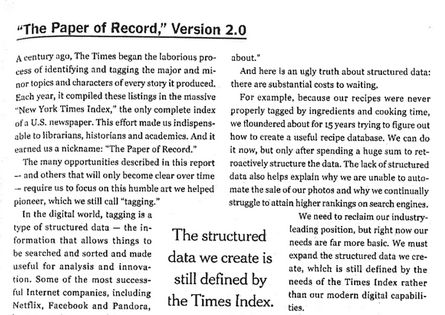And it’s not just for your audience
You might have heard about Buzzfeed’s leak of the New York Times Innovation Report. A lot of analysis has been done on some aspects of the report, particularly on the “death” of the homepage (which isn’t necessarily a bad thing for brands).
A different section of the report caught my attention — “The Paper of Record,” Version 2.0.

This section of the report describes the importance of tagging metadata to support an enterprise that produces thousands of articles per year. A failure to properly tag content in the past means that the Times is putting significant investment now in retroactive work. While the New York Times has a storied history as a data-driven resource, to say it has fallen behind in terms of structured data is an understatement. What does it mean these days to be the “Paper of Record” if its records cannot easily be correlated?
To succeed in the digital age is to be able to easily aggregate all of your articles in the most meaningful way for each of your visitors. Competitors such as Circa actively use metadata to surface relevant content during breaking news events. It is no wonder that social traffic to the New York Times is suffering if visitors can more readily access relevant content elsewhere.
It’s not just about the audience-facing benefits though, and this is where the Innovation Report seems to miss the point.
Metadata doesn’t just help your audience access content, it helps you as a publisher understand what works.
A grand total of one sentence is spent to note that the Washington Post and Wall Street Journal use metadata for generating insights on audience preferences. I cannot believe that the authors of this report truly understood the importance of metadata if this was the only output.
Adam Felder, Associate Director of Analytics at Atlantic Media, uses metadata to help contextualize how different subjects play to audiences. On the back end, using modified baseball statistics such as batting average and slugging percentage, he can compare any number of tags against each other. This could include any of the structured data tags that are mentioned in the NYT report: geographic location, story type, story tone, etc.
There’s a certain amount of content optimization that can be done here. Think if you were to tag articles based on whether they included a video; you could then analyze whether having this element improved article performance. This would help you to decide whether it made sense to embed more videos in the future. I wouldn’t trust an analysis of what sorts of content/elements work for a given audience without the use of metadata to back up the findings.
Take heed of the Times’ failure to stay up to date on tagging metadata; it’s easier to put in the time to tag article by article now as opposed to having to go back and tag after the fact. In the meantime, it will help you to optimize your content to be topical and useful for your audience.
